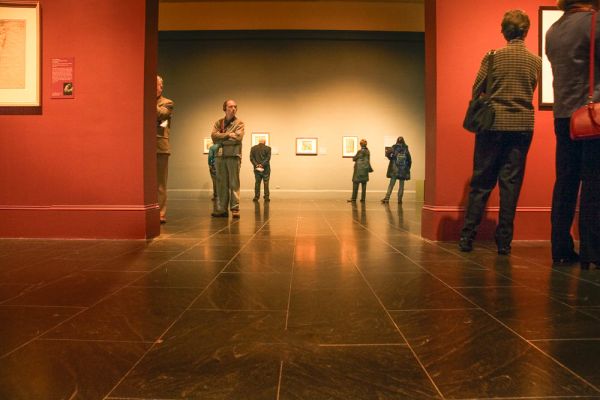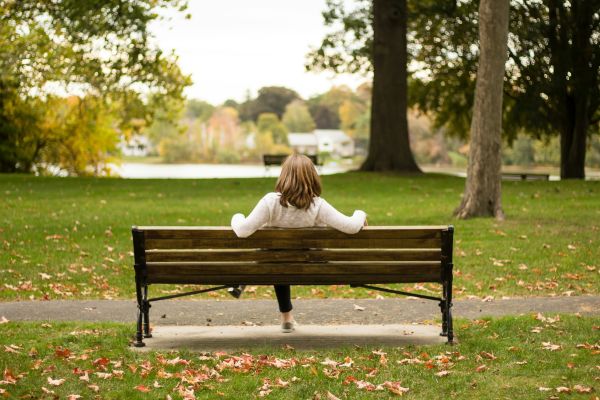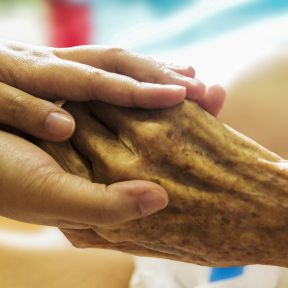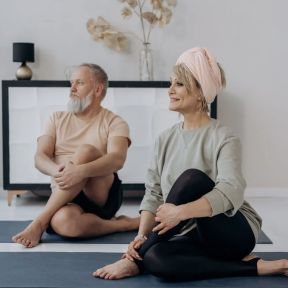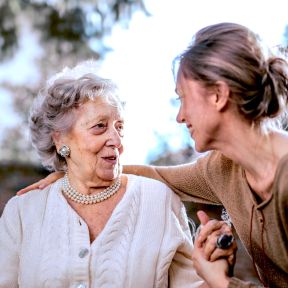Caring for Aging Loved Ones
As your grandparents get older, you may catch one or both feeling confused about medication, having no need to leave the house, forgetting their appointments, purchasing unnecessary items, driving into a tree, or any number of things that shout for attention. Your worries and fears are warranted and you wonder how to care for them. Most caregivers are family members, and they are the first to notice even the slightest change in their senior’s behavior. You will also know when it’s unsafe for your loved one to live at home without the care they need.

According to the National Alliance for Caregiving, there are 44 million family caregivers, which is nearly 20 percent of the adult population in the U.S. It's not so surprising that most caregivers are women, and that most caregivers are close family members. Often, these individuals are raising their own children as well—hence, the term sandwich generation. Caregivers, who are often over the age of 50 themselves, provide physical and financial assistance to elderly loved ones. The National Alliance has also found that while women provide the lion's share of basic care, both men and women also provide financial assistance, with an aggregate cost, in lost wages and benefits, of some $3 trillion annually.
If you're noticing changes in your loved one's memory or changes in cognitive function, keep track of what is happening: Mom loses her keys or wallet all of the time. She leaves the stove on. She forgets that she already added salt to her meal. She got lost driving home. Have these changes transpired gradually, or have they happened suddenly? Where one day, your loved one is fine, and the next day they're confused. Write down when you noticed these changes and whether they happened in tandem with other events. Perhaps the changes occurred with a big move to a new home. Or after the death of someone close. Or maybe a family member got divorced. Did the changes occur because of medication? Did your loved one take a fall?
After you write down the changes you noticed, share them with care and empathy. Also, suggest that you would like to accompany Mom on her doctor’s visit. Share your information with her physician. However, some older adults will not want you to accompany them. You will need to ask Mom whether you can communicate with her physician directly. Or perhaps she can deliver the information you have recorded.
Hiring a caregiver can be costly, and hiring through an agency may be even costlier. However, there are resources to look into including Medicaid, Medicare, as well as other government services such as veterans’ benefits and adult day-care facilities. There are also options for community support in the form of share-a-ride amenities and home-delivered meal services. Depending on where you live, there are varying community services for the elderly programs to explore.
Retirement homes, communal living, or co-housing situations can offer social interaction, medical attention, prepared meals, physical and mental fitness activities, among other advantages. However, many seniors balk at the idea. Part of the problem is loss aversion. Your dad may feel that he is giving up a lot, his neighbors, his pharmacist, his spacious home, all of which is a high price to pay. The other reason is the feeling of being above average. All of us feel we are above average when compared with everyone else, we’re smarter, better at driving, better looking, and better at everything. Of course, your dad thinks he can still drive.
Social skills are necessary for younger people and older people. Your mom may need to get out of her safe haven and extend herself more, as older people do get set in the way they are. She is old and tired, and being friendly and extending oneself is work. However, she may also be grappling with less-than-compassionate care workers and, or, less-than-friendly residents. There are reports of assisted living situations that sometimes mirror middle school and its accompanying drama of bullies and mean girls. Depending on cognitive capacity, residents may separate themselves, where frailer seniors are not invited to the table with robust conversation about current trends and topics.
Yes. It is important that end-of-life plans are made clear. There is a tendency to think that there will always be time for this planning. However, many people are blind-sided by illness. To be ready for serious illness, your loved ones will need to have their wishes and medical directives spelled out. Plus, they will need to organize their finances, estate needs, and last testaments as well.
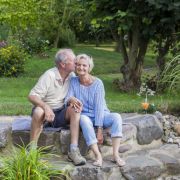
Conventional wisdom says that one can live a long and meaningful life by keeping the mind sharp and the body moving. Plus, plenty of sleep, a healthy diet, and physical activity are all beneficial as well. Yet one of the more crucial items on the list, research suggests, is maintaining good relationships. Having a meaningful social life with close others who support you and listen to you can have a significant influence on overall health outcomes. In cultures with some of the world's longest average life spans—for example, Okinawa, Costa Rica, Greece—activity, diet, and close relationships are at the core of an elder’s everyday life. And in this Internet age, staying connected with friends and family who live across the country is getting easier. Plugging into social media may have its drawbacks, but pandemics notwithstanding, staying virtually connected is a positive.
We all need our support systems and through all ages. But older adults should have a close network because of the assistance they require. Older people who no longer drive, for example, depend on others for many essential needs including groceries, supplies, or a ride to the doctor’s office. They may also need help with bill paying, estate maintenance, or other related tasks. Older adults who have robust networks fare much better in mental and physical health.
People rely on their partners more and more as they age. And husbands rely on their wives for emotional support throughout their lives. But for older adults, their networks of friends and support dwindles—people move away, friends die. Marriage becomes ever more important. Of course, good relationships are healthy for you, bad relationships are just plain bad. A long-time nagging and complaining partner is not supportive and does little for a person's health and happiness. This lack of support and unneeded strain is harder on men than on women, as women tend to be healthier and live longer than men.
Sadly, the experience of family estrangement is not uncommon and takes a toll on parents, especially later in life, when family harmony in one's lifetime can become an overarching desire. Also, conflict between adult siblings or the feeling of unfair treatment among siblings can impact an aging parent. Most aging parents are keen to reconcile, but adult children are slower to make amends. Daughters are more likely than sons to reconcile with estranged parents, and, on average, their conflicts are less enduring than are those of sons and parents.
Regardless of family relationships, we all fare better when we have close friends. Also, loneliness is not always ameliorated through family bonds, while close friendships do impact loneliness, health, and well-being. Research shows that people live longer and are healthier if they have a supportive network of friends, and it’s even better if the friends are in close proximity. When you have friends as neighbors, your health and happiness increases by 25 percent.
Younger people have readymade networks. For example, we meet in the dormitory, the classroom, summer camp, and running club. And in professional life, we make lifelong friends with colleagues, associates, and clients. But our social networks shrink as we age. As mentioned, friends die off or move away, and we become set in our comfort zone of exclusion. It’s important that we actively pursue our interests, as we often meet people along the way.


